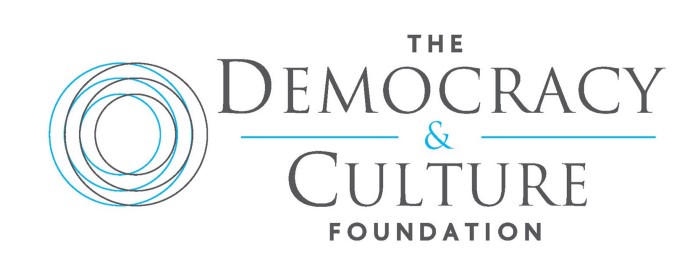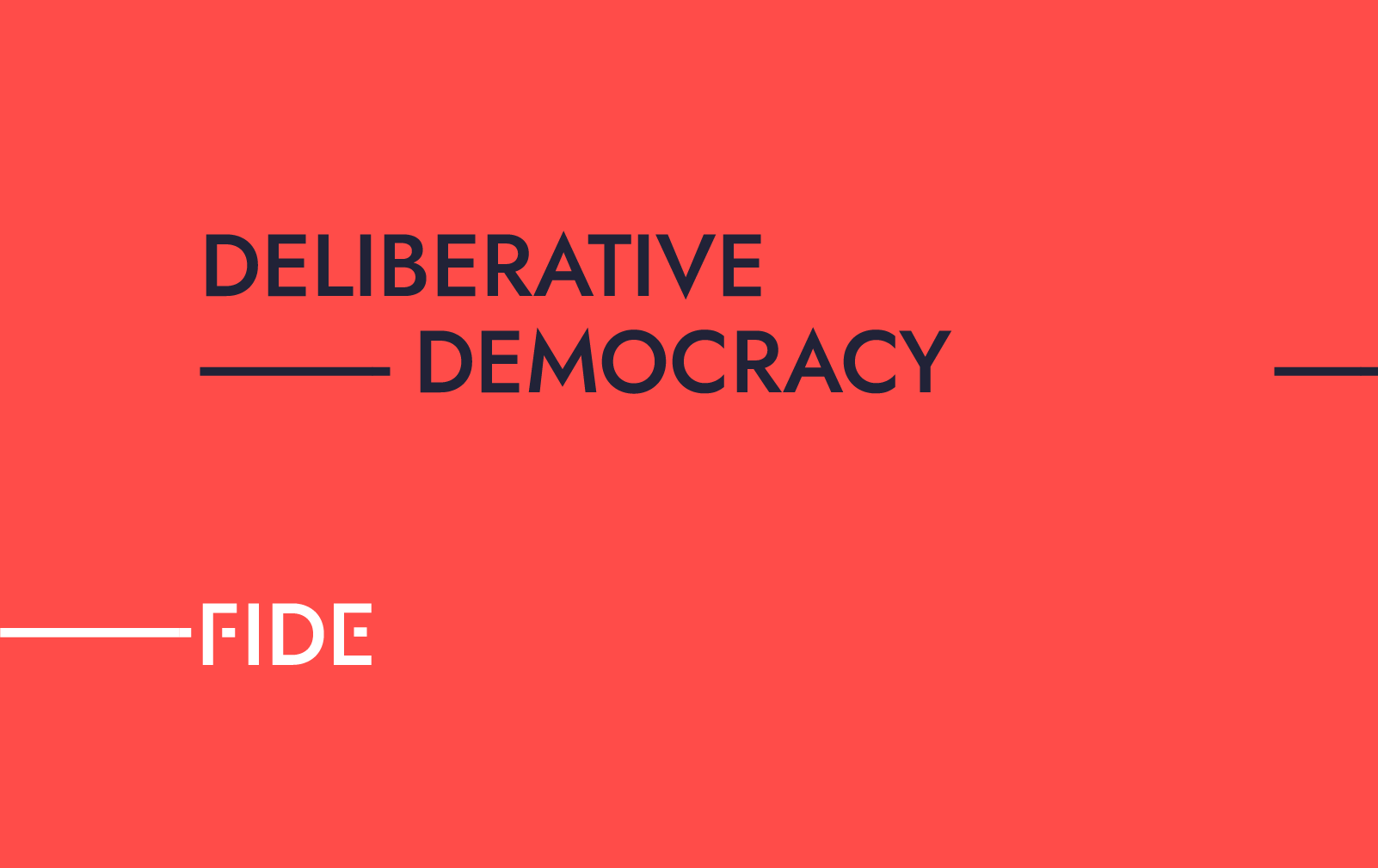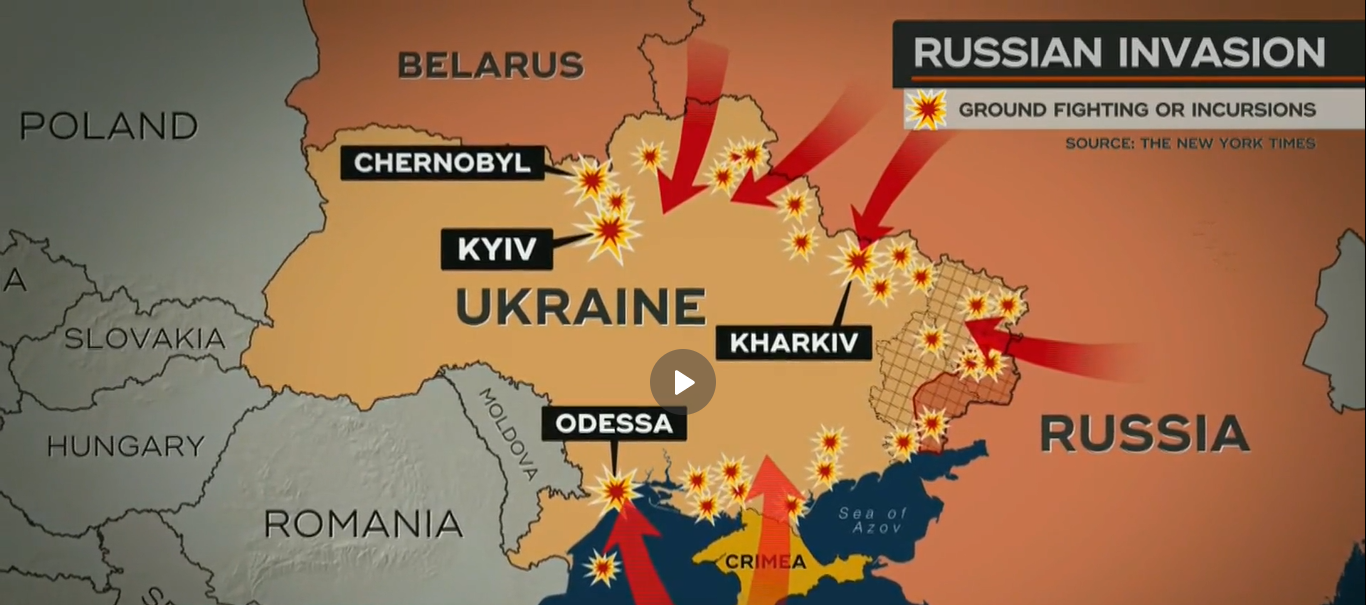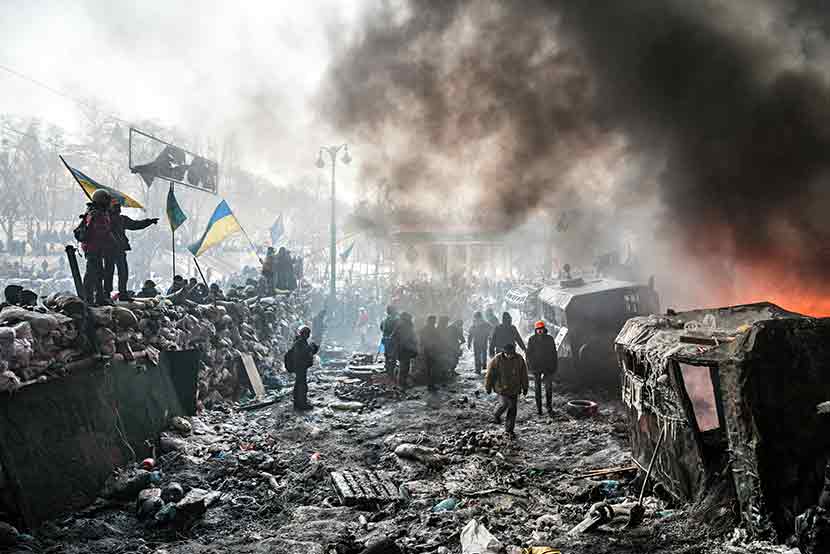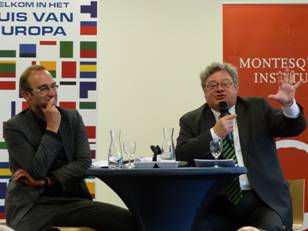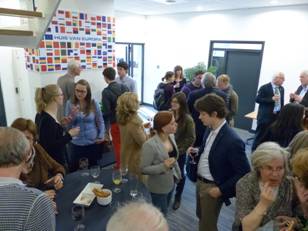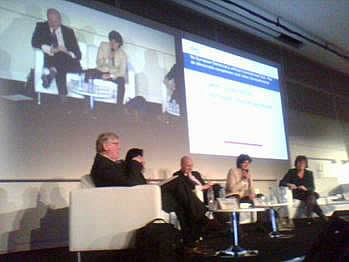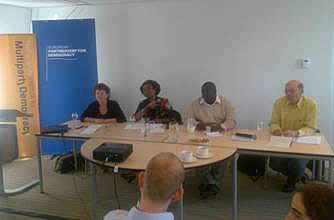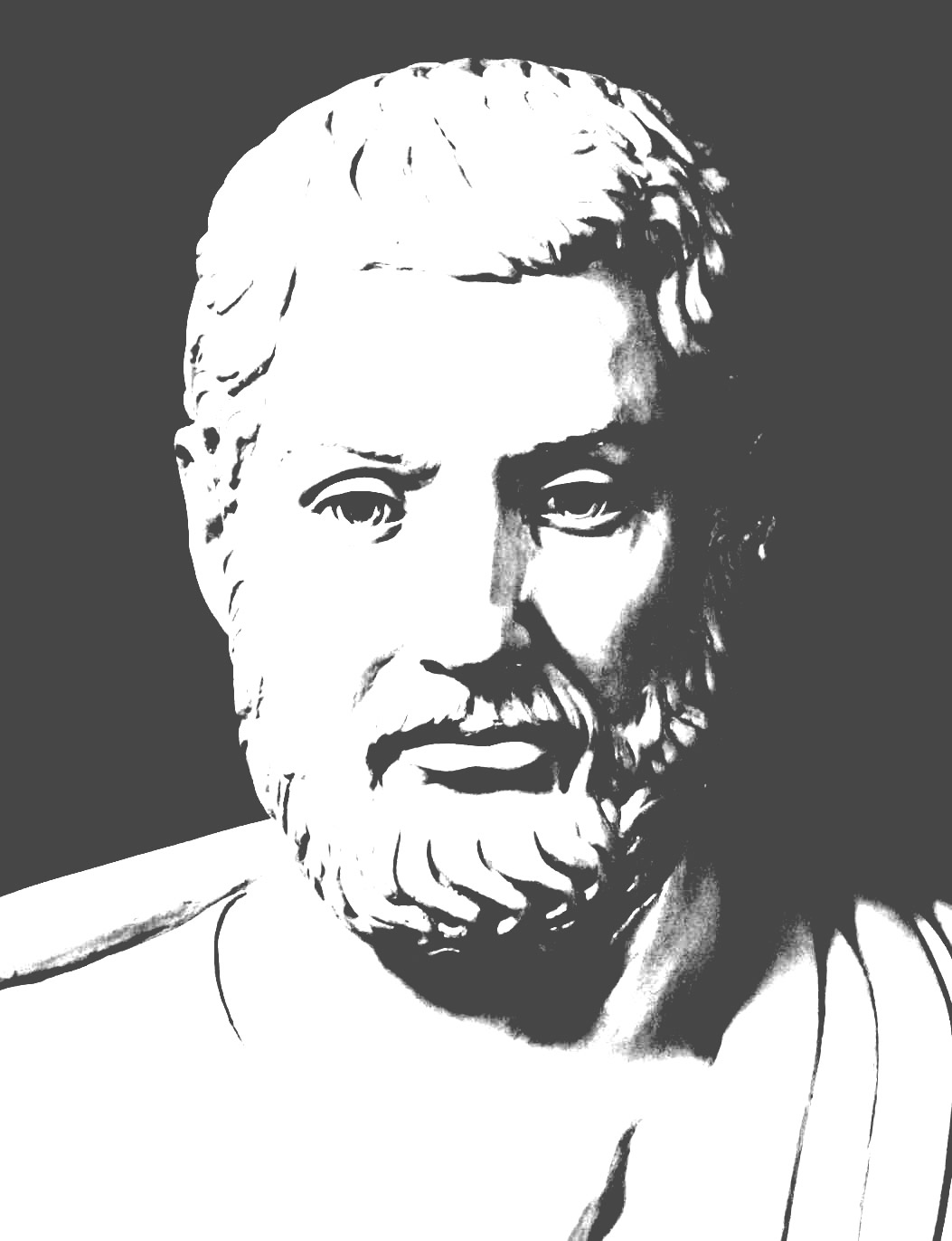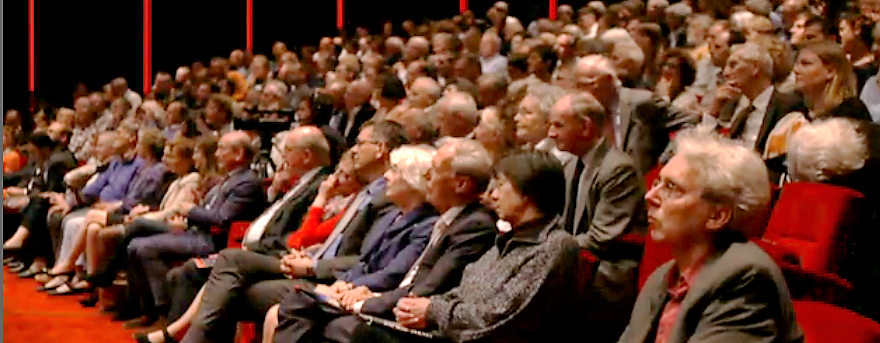20th century transitions to liberal democracy have come in successive "waves of democracy," variously resulting from wars, revolutions, decolonization, and economic circumstances. World War I and the dissolution of the Ottoman and Austro-Hungarian empires resulted in the creation of new nation-states in Europe, most of them nominally democratic. In the 1920s democracy flourished, but the Great Depression brought disenchantment, and most the countries of Europe, Latin America, and Asia turned to strong-man rule or dictatorships. Fascism and dictatorships flourished in Nazi Germany, Italy, Spain and Portugal, as well as nondemocratic regimes in Poland, the Baltics, the Balkans, Brazil, Cuba, China, and Japan, among others. Together with Stalin's regime in the Soviet Union, these made the 1930s the "Age of Dictators"
World War II brought a definitive reversal of this trend in western Europe. The successful democratization of the occupied Germany and the occupied Japan served as a model for the later theory of regime change. However, most of Eastern Europe was forced into the non-democratic Soviet bloc. The war was followed by decolonisation, and again most of the new independent states had nominally democratic constitutions. In the decades following World War II, most western democratic nations had mixed economies and developed a welfare state, reflecting a general consensus among their electorates and political parties. In the 1950s and 1960s, economic growth was high in both the western and Communist countries; it later declined in the state-controlled economies. By 1960, the vast majority of nation-states were nominally democracies, although the majority of the world's populations lived in nations that experienced sham elections, and other forms of subterfuge (particularly in Communist nations and the former colonies.)
A subsequent wave of democratisation brought substantial gains toward true liberal democracy for many nations. Several of the military dictatorships in South America became democratic in the late 1970s and early 1980s. This was followed by nations in East and South Asia by the mid- to late 1980s. Economic malaise in the 1980s, along with resentment of communist oppression, contributed to the collapse of the Soviet Union, the associated end of the Cold War, and the democratization and liberalisation of the former Eastern bloc countries. The most successful of the new democracies were those geographically and culturally closest to western Europe, and they are now members or candidate members of the European Union. The liberal trend spread to some nations in Africa in the 1990s, most prominently in South Africa. Some recent examples include the Indonesian Revolution of 1998, the Bulldozer Revolution in Yugoslavia, the Rose Revolution in Georgia, the Orange Revolution in Ukraine, the Cedar Revolution in Lebanon, and the Tulip Revolution in Kyrgyzstan.
The number of liberal democracies currently stands at an all-time high and has been growing without interruption for some time. As such, it has been speculated that this trend may continue in the future to the point where liberal democratic nation-states become the universal standard form of human society. This prediction forms the core of Francis Fukayama's "End of History" theory.
THEORIES
Conceptions
Among political theorists, there are many contending conceptions of democracy.
Aggregative democracy uses democratic processes to solicit citizens’ preferences and then aggregate them together to determine what social policies society should adopt. Therefore, proponents of this view hold that democratic participation should primarily focus on voting, where the policy with the most votes gets implemented. There are different variants of this:
Under minimalism, democracy is a system of government in which citizens give teams of political leaders the right to rule in periodic elections. According to this minimalist conception, citizens cannot and should not “rule” because, for example, on most issues, most of the time, they have no clear views or their views are not well-founded. Joseph Schumpeter articulated this view most famously in his book Capitalism, Socialism, and Democracy. Contemporary proponents of minimalism include William H. Riker, Adam Przeworski, Richard Posner.
Direct democracy, on the other hand, holds that citizens should participate directly, not through their representatives, in making laws and policies. Proponents of direct democracy offer varied reasons to support this view. Political activity can be valuable in itself, it socializes and educates citizens, and popular participation can check powerful elites. Most importantly, citizens do not really rule themselves unless they directly decide laws and policies.
Government should produce laws and policies that are close to the views of the median voter — with half to his left and the other half to his right. Anthony Downs laid out this view in his 1957 book An Economic Theory of Democracy.
Robert A. Dahl argues that the fundamental democratic principle is that, when it comes to binding collective decisions, each person in a political community is entitled to have his/her interests be given equal consideration (not necessarily that all people are equally satisfied by the collective decision). He uses the term Polyarchy to refer to societies in which there exists a certain set of institutions and procedures which are perceived as leading to such democracy.
First and foremost among these institutions is the regular occurrence of free and open elections which are used to select representatives who then manage all or most of the public policy of the society. However, these polyarchic procedures may not create a full democracy if, for example, poverty prevents political participation. Some see a problem with the wealthy having more influence and therefore argue for reforms like campaign finance reform. Some may see it as a problem that the majority of the voters decide policy, as opposed to majority rule of the entire population. This can be used as an argument for making political participation mandatory, like compulsory voting.
Deliberative democracy is based on the notion that democracy is government by discussion. Deliberative democrats contend that laws and policies should be based upon reasons that all citizens can accept. The political arena should be one in which leaders and citizens make arguments, listen, and change their minds. One modern proponents of this form of government are led by Jürgen Habermas.
"Democracy" and "Republic"
In historical usages and especially when considering the works of the Founding Fathers of the United States, the word "democracy" refers solely to direct democracy, while a representative democracy where representatives of the people are elected and whose power to govern is limited by laws enshrined in a constitution is referred to as a constitutional republic. Constitutional Republics are a deliberate attempt to diminish the threat of mobocracy thereby protecting minority groups from the tyranny of the majority by placing checks on the power of the majority of the population. The power of the majority of the people is checked by limiting that power to electing representatives who govern within limits of overarching constitutional law rather than the popular vote having legislative power itself. Moreover, the power of elected representatives is also checked by prohibitions against any single individual having legislative, judicial, and executive powers so that basic constitutional law is extremely difficult to change. John Adams defined a constitutional republic as "a government of laws, and not of men." Using the term "democracy" to refer solely to direct democracy, or to representative democracy without checks on the power of elected officials, retains some popularity in United States conservative and libertarian circles.
The original framers of the United States Constitution were notably cognizant of what they perceived as a danger of majority rule in oppressing freedom and liberty of the individual. For example, James Madison, in Federalist Paper No. 10, advocates a constitutional republic over a democracy to protect the individual from the majority. The framers carefully created the institutions within the Constitution and the United States Bill of Rights. They kept what they believed were the best elements of majority rule. But they were mitigated by a constitution with protections for individual liberty, a separation of powers, and a layered federal structure.
However, in contemporary usage, the term "democracy" refers to a government chosen by the people, whether it is direct or representative. The term "republic" has many different meanings but today often refers to a representative democracy with an elected head of state, such as a President, serving for a limited term, in contrast to states with a hereditary monarch as a head of state, even if these states also are representative democracies with an elected head of government such as a Prime Minister. Therefore, today the term is used by states which are quite different from the earlier use of the term, such as the Islamic Republic of Iran and the former German Democratic Republic.
Republicanism and Liberalism have complex relationships to democracy and republic. See these articles for more details.
Constitutional monarchs and upper chambers
Initially after the American and French revolutions the question was open whether a democracy, in order to restrain unchecked majority rule, should have an elitist upper chamber, the members perhaps appointed meritorious experts or having lifetime tenures, or should have a constitutional monarch with limited but real powers. Some countries (as Britain, the Netherlands, Belgium, Scandinavian countries and Japan) turned powerful monarchs into constitutional monarchs with limited or, often gradually, merely symbolic roles. Often the monarchy was abolished along with the aristocratic system (as in the U.S., France, China, Russia, Germany, Austria, Hungary, Italy, Greece and Egypt). Many nations had elite upper houses of legislatures which often had lifetime tenure, but eventually these senates lost power (as in Britain) or else became elective and remained powerful (as in the United States).
Democratic state
Though there remains some philosophical debate as to the applicability and legitimacy of criteria in defining democracy what follows may be a minimum of requirements for a state to be considered democratic (note that for example anarchists may support a form of democracy but not a state):
-
A demos—a group which makes political decisions by some form of collective procedure—must exist. Non-members of the demos do not participate. In modern democracies the demos is the adult portion of the nation, and adult citizenship is usually equivalent to membership.
-
A territory must be present, where the decisions apply, and where the demos is resident. In modern democracies, the territory is the nation-state, and since this corresponds (in theory) with the homeland of the nation, the demos and the reach of the democratic process neatly coincide. Colonies of democracies are not considered democratic by themselves, if they are governed from the colonial motherland: demos and territory do not coincide.
-
A decision-making procedure exists, which is either direct, in instances such as a referendum, or indirect, of which instances include the election of a parliament.
-
The procedure is regarded as legitimate by the demos, implying that its outcome will be accepted. Political legitimacy is the willingness of the population to accept decisions of the state, its government and courts, which go against personal choices or interests.
-
The procedure is effective in the minimal sense that it can be used to change the government, assuming there is sufficient support for that change. Showcase elections, pre-arranged to re-elect the existing regime, are not democratic.
-
In the case of nation-states, the state must be sovereign: democratic elections are pointless if an outside authority can overrule the result.
Advantages and disadvantages of liberal democracy
Direct democracy
Some argue that "liberal democracy" does not respect absolute majority rule (except when electing representatives). The "liberty" of majority rule is restricted by the constitution or precedent decided by previous generations. Also, the real power is actually held by a relatively small representative body. Thus, the argument goes, "liberal democracy" is merely a decoration over an oligarchy. For example a system of direct democracy would be preferable. New technology, such as E-democracy, may make direct democracy easier to implement.
Others would say that only a liberal democracy can guarantee the individual liberties of its citizens and prevent the development into a dictatorship. Unmoderated majority rule could, in this view, lead to an oppression of minorities. Another argument is that the elected leaders may be more interested and able than the average voter. A third that it takes much effort and time if everyone should gather information, discuss, and vote on most issues.
Some liberal democracies have elements of direct democracy such as referenda and plebiscite. Switzerland and Uruguay are some examples; likewise several states of the United States. Many other countries have referenda to a lesser degree in their political system.
Democracy and ethnic and religious conflicts
For historical reasons, many states are not culturally and ethnically homogeneous. There may be sharp ethnic, linguistic, religious and cultural divisions. In fact, some groups may be actively hostile to each other. A democracy, which by definition allows mass participation in decision-making theoretically also allows the use of the political process against 'enemy' groups. That may be especially visible during democratization, if the previous non-democratic government oppressed certain groups. It is also visible in established democracies, in the form of anti-immigrant populism. However, arguably the worst repressions have occurred in states without universal suffrage, like formerly apartheid South Africa and Nazi Germany.
It is claimed that democratization can increase ethnic conflicts when an ethnic minority is disproportionately wealthy. "When free market democracy is pursued in the presence of a market-dominant minority, the almost invariable result is backlash. This backlash typically takes one of three forms. The first is a backlash against markets, targeting the market-dominant minority's wealth. The second is a backlash against democracy by forces favorable to the market-dominant minority. The third is violence, sometimes genocidal, directed against the market-dominant minority itself.". Also, "overnight democracy will empower the poor, indigenous majority. What happens is that under those circumstances, democracy doesn't do what we expect it to do -- that is, reinforce markets. [Instead,] democracy leads to the emergence of manipulative politicians and demagogues who find that the best way to get votes is by scapegoating the minorities." Chua also states that she is "big fan of trying to promote markets and democracy globally", but that it should be accompanied by attempts to "redistribute the wealth, whether it's property title and giving poor people property, land reform .... Redistributive mechanisms are tough to have if you have so much corruption."
The collapse of the Soviet Union and the partial democratisation of Soviet bloc states was followed by wars and civil war in the former Yugoslavia, in the Caucasus, and in Moldova. Nevertheless, statistical research shows that the fall of Communism and the increase in the number of democratic states were accompanied by a sudden and dramatic decline in total warfare, interstate wars, ethnic wars, revolutionary wars, and the number of refugees and displaced people. See also the section below on Majoritarianism and Democratic peace theory.
Bureaucracy
A persistent libertarian and monarchist critique of democracy is the claim that it encourages the elected representatives to change the law without necessity, and in particular to pour forth a flood of new laws. This is seen as pernicious in several ways. New laws constrict the scope of what were previously private liberties. Rapidly changing laws make it difficult for a willing non-specialist to remain law-abiding. This may be an invitation for law-enforcement agencies to misuse power. The claimed continual complication of the law may be contrary to a claimed simple and eternal natural law - although there is no consensus on what this natural law is, even among advocates. Supporters of democracy point to the complex bureaucracy and regulations that has occurred in dictatorships, like many of the former Communist states.
Liberal democracies are also criticized for a claimed slowness and complexity of their decision-making.
Short-term focus
Modern liberal democracies, by definition, allow for regular changes of government. That has led to a common criticism of their short-term focus. In four or five years the government will face a new election, and it must think of how it will win that election. That would encourage a preference for policies that will bring short term benefits to the electorate (or to self-interested politicians) before the next election, rather than unpopular policy with longer term benefits. This criticism assumes that it is possible to make long term predictions for a society, something Karl Popper has criticized as historicism.
Besides the regular review of governing entities, short-term focus in a democracy could also be the result of collective short-term thinking. For example, consider a campaign for policies aimed at reducing environmental damage while causing temporary increase in unemployment. However, this risk applies also to other political systems.
Anarcho-capitalist Hans-Herman Hoppe explained short-termism of the democratic governments by the rational choice of currently ruling group to overexploit temporarily accessible resources, thus deriving maximal economic advantage to the members of this group. (He contrasted this with hereditary monarchy, in which a monarch has an interest in preserving the long-term capital value of his property (i.e. the country he owns) counter-balancing his desire to extract immediate revenue. He argues that the historical record of levels of taxation in certain monarchies (5-8%) and certain liberal democracies (40-60%) seems to confirm this contention. On the other hand, in hereditary autocracies like North Korea the state controls the whole economy while many liberal democratic states that score very high on rankings of economic freedom.
Public choice theory
Public choice theory is a branch of economics that studies the decision-making behavior of voters, politicians and government officials from the perspective of economic theory. One studied problem is that each voter has little influence and may therefore have a rational ignorance regarding political issues. This may allow special interest groups to gain subsidies and regulations beneficial to them but harmful to society. However, special interest groups may be equally or more influential in nondemocracies.
Plutocracy
Marxists, socialists and left-wing anarchists, argue that liberal democracy is an integral part of the capitalist system and is class-based and not fully democratic or participatory. It is bourgeois democracy where only the most financially powerful people rule. Because of this it is seen as fundamentally un-egalitarian, existing or operating in a way that facilitates economic exploitation. According to Marx, parliamentary elections are an opportunity citizens of a country get every few years to decide who among the ruling classes will misrepresent them in parliament.
The cost of political campaigning in representative democracies may mean that the system favors the rich, a form of plutocracy who may be a very small minority of the voters. In Athenian democracy, some public offices were randomly allocated to citizens, in order to inhibit the effects of plutocracy. Modern democracy may also be regarded as a dishonest farce used to keep the masses from getting restless, or a conspiracy for making them restless for some political agenda. It may encourage candidates to make deals with wealthy supporters, offering favorable legislation if the candidate is elected - perpetuating conspiracies for monopolization of key areas. Campaign finance reform is an attempt to correct this perceived problem. However, United States economist Steven Levitt claims in his book Freakonomics, that campaign spending is no guarantee of electoral success. He compared electoral success of the same pair of candidates running against one another repeatedly for the same job, as often happens in United States Congressional elections, where spending levels varied. He concludes:
"A winning candidate can cut his spending in half and lose only 1 percent of the vote. Meanwhile, a losing candidate who doubles his spending can expect to shift the vote in his favor by only that same 1 percent."
Ownership of the media by the few may lead to more specific distortion of the electoral process, since the media are themselves a vital element of that process. Some critics argue that criticism of the status quo or a particular agenda tends to be suppressed by such media cartels, to protect their own self-interests. Proponents respond that constitutionally protected freedom of speech makes it possible for both for-profit and non-profit organizations to debate the issues. They argue that media coverage in democracies simply reflects public preferences, and does not entail censorship.
Limited voter turnout
Some see a problem with limited voter turnout since not all eligible voters participate in the political process. Get out the vote campaigns may increase voter turnout but may be advocated by special interest groups. Some therefore argue for compulsory voting and several nations have this system. Proponents argue that this increases the legitimacy of the elections and ensures political participation by all those affected by the political process. Also, political parites do not have to spend time and energy convincing voters that they should vote at all. Arguments against include restriction of freedom, economic costs of enforcing this, increased number of invalid and blank votes, and random voting.
Majoritarianism
The "tyranny of the majority" is the fear that a democratic government, reflecting the majority view, can take action that oppresses a particular minority. Theoretically, the majority could only be a majority of those who vote and not a majority of the citizens. In those cases, one minority tyrannizes another minority in the name of the majority. It can apply in both direct democracy or representative democracy.
Possible examples include:
those potentially subject to conscription are a minority.
several European countries have introduced bans on personal religious symbols in public schools. Opponents see this as a violation of rights to freedom of religion. Supporters see it as following from the separation of state and religious activities.
prohibition of pornography is typically determined by what the majority is prepared to accept.
recreational drug use is also typically legalized (or at least tolerated) to the degree that the majority finds acceptable. Users may see themselves as an oppressed minority, victims of unjustifiable criminalisation.
society's treatment of homosexuals is also cited in this context. Homosexual acts were widely criminalised in democracies until several decades ago; in some democracies they still are, reflecting the religious or sexual mores of the majority.
the Athenian democracy and the early United States had slavery.
society's treatment of homosexuals is also cited in this context. Homosexual acts were widely criminalised in democracies until several decades ago; in some democracies they still are, reflecting the religious or sexual mores of the majority.
the Athenian democracy and the early United States had slavery.
the majority often taxes the minority who are wealthy at progressively higher rates, with the intention that the wealthy will incur a larger tax burden for social purposes. However, this is generally offset to some degree, by their better access to relevant expert advice (tax consultants and lawyers).
in prosperous western democracies, the poor form a minority of the population, and may be disadvantaged by a majority who resent transfer taxation. Especially when they form a distinct underclass, the majority may use the democratic process to, in effect, withdraw the protection of the state.
An often quoted example of the 'tyranny of the majority' is that Adolf Hitler came to power by legitimate democratic procedures. The Nazi party gained the largest share of votes in the democratic Weimar republic in 1933. Some might consider this an example of "tyranny of a minority" since he never gained a majority vote, but it is common for a plurality to exercise power in democracies, so the rise of Hitler can not be considered irrelevant. However, his regime's large-scale human rights violations took place after the democratic system had been abolished. Also, the Weimar constitution in an "emergency" allowed dictatorial powers and suspension of the essentials of the constitution itself without any vote or election, something not possible in most liberal democracies.
Proponents of democracy make a number of defenses concerning 'tyranny of the majority'. One is to argue that the presence of a constitution protecting the rights of all citizens in many democratic countries acts as a safeguard. Generally, changes in these constitutions require the agreement of a supermajority of the elected representatives, or require a judge and jury to agree that evidentiary and procedural standards have been fulfilled by the state, or two different votes by the representatives separated by an election, or, sometimes, a referendum. These requirements are often combined. The separation of powers into legislative branch, executive branch, judicial branch also makes it more difficult for a small majority to impose their will. This means a majority can still legitimately coerce a minority (which is still ethically questionable), but such a minority would be very small and, as a practical matter, it is harder to get a larger proportion of the people to agree to such actions.
Another argument is that majorities and minorities can take a markedly different shape on different issues. People often agree with the majority view on some issues and agree with a minority view on other issues. One's view may also change. Thus, the members of a majority may limit oppression of a minority since they may well in the future themselves be in a minority.
A third common argument is that, despite the risks, majority rule is preferable to other systems, and the tyranny of the majority is in any case an improvement on a tyranny of a minority. All the possible problems mentioned above can also occur in nondemocracies with the added problem that a minority can oppress the majority. Proponents of democracy argue that empirical statistical evidence strongly shows that more democracy leads to less internal violence and mass murder by the government. This is sometimes formulated as Rummel's Law, which states that the less democratic freedom a people have, the more likely their rulers are to murder them.
Political stability
One argument for democracy is that by creating a system where the public can remove administrations, without changing the legal basis for government, democracy aims at reducing political uncertainty and instability, and assuring citizens that however much they may disagree with present policies, they will be given a regular chance to change those who are in power, or change policies with which they disagree. This is preferable to a system where political change takes place through violence.
Some think that political stability may be considered as excessive when the group in power remains the same for an extended period of time. On the other hand, this is more common in nondemocracies.
One notable feature of liberal democracies is that their opponents (those groups who wish to abolish liberal democracy) rarely win elections. Advocates use this as an argument to support their view that liberal democracy is inherently stable and can usually only be overthrown by external force, while opponents argue that the system is inherently stacked against them despite its claims to impartiality. In the past, it was feared that democracy could be easily exploited by leaders with dictatorial aspirations, who could get themselves elected into power. However, the actual number of liberal democracies that have elected dictators into power is low. When it has occurred, it is usually after a major crisis have caused many people to doubt the system or in young/poorly functioning democracies. Some possible examples include Adolf Hitler during the Great Depression and Napoleon III who become first President of the young Second French Republic and later Emperor.
Effective response in wartime
A liberal democracy, by definition, implies that power is not concentrated. One criticism is that this could be a disadvantage for a state in wartime, when a fast and unified response is necessary. The legislature usually must give consent before the start of an offensive military operation, although sometimes the executive can do this on its own while keeping the legislature informed. If the democracy is attacked, then no consent is usually required for defensive operations. The people may vote against a conscription army. Monarchies and dictatorships can in theory act immediately and forcefully.
However, actual research shows that democracies are more likely to win wars than non-democracies. One explanation attributes this primarily to "the transparency of the polities, and the stability of their preferences, once determined, democracies are better able to cooperate with their partners in the conduct of wars". Other research attributes this to superior mobilization of resources or selection of wars that the democratic states have a high chance of winning.
Stam and Reiter (2002, p. 64-70) also note that the emphasis on individuality within democratic societies means that their soldiers fight with greater initiative and superior leadership. Officers in dictatorships are often selected for political loyalty rather than ability. They may be exclusively selected from a small class or religious/ethnic group that support the regime. Also this may also exclude many able officers. The leaders in nondemocracies may respond violently to any perceived criticisms or disobedience. This may make the soldiers and officers afraid to raise any objections or do anything without explicit authorisation. The lack of initiative may be particularly detrimental in modern warfare. Enemy soldiers may more easily surrender to democracies since they can expect comparatively good treatment. Nazi Germany killed almost 2/3 of the captured Soviet soldiers. 38% of the American soldiers captured by North Korea in the Korean War were killed.
Better information on and corrections of problems
A democratic system may provide better information for policy decisions. Undesirable information may more easily be ignored in dictatorships, even if this undesirable or contrarian information provides early warning of problems. The democratic system also provides a way to replace inefficient leaders and policies. Thus, problems may continue longer and crises of all kinds may be more common in autocracies.
Corruption
Research by the World Bank suggests that political institutions are extremely important in determining the prevalence of corruption: democracy, parliamentary systems, political stability, and freedom of the press are all associated with lower corruption. Freedom of information legislation is important for accountability and transparency. The Indian Right to Information Act "has already engendered mass movements in the country that is bringing the lethargic, often corrupt bureaucracy to its knees and changing power equations completely."
Terrorism
Several studies have concluded that terrorism is most common in nations with intermediate political freedom. The nations with the least terrorism are the most democratic nations. However, critics of Western democracy have argued that, according to official definitions of terrorism, liberal democratic states have committed many acts of terrorism against other nations.
Economic growth and financial crises
Statistically, more democracy correlates with a higher gross domestic product (GDP) per capita. Claus Offe made substantive contributions to understanding the relationships between democracy and capitalism
However, there is disagreement regarding how much credit the democratic system can take for this. One observation is that democracy became widespread only after the industrial revolution and the introduction of capitalism. On the other hand, the industrial revolution started in England which was one of the most democratic nations for its time within its own borders. (But this democracy was very limited and did not apply to the colonies which contributed significantly to the wealth.)
Several statistical studies support the theory that more capitalism, measured for example with one the several Indices of Economic Freedom which has been used in hundreds of studies by independent researchers, increases economic growth and that this in turn increases general prosperity, reduces poverty, and causes democratization. This is a statistical tendency, and there are individual exceptions like India, which is democratic but arguably not prosperous, or Brunei, which has a high GDP but has never been democratic. There are also other studies suggesting that more democracy increases economic freedom although a few find no or even a small negative effect.One objection might be that nations like Sweden and Canada today score just below nations like Chile and Estonia on economic freedom but that Sweden and Canada today have a higher GDP per capita. However, this is a misunderstanding, the studies indicate effect on economic growth and thus that future GDP per capita will be higher with higher economic freedom. It should also be noted that according to the index Sweden and Canada are among the world's most capitalist nations, due to factors such as strong rule of law, strong property rights, and few restrictions against free trade. Critics might argue that the Index of Economic Freedom and other methods used does not measure the degree of capitalism, preferring some other definition.
Some argue that economic growth due to its empowerment of citizens, will ensure a transition to democracy in countries such as China. However, other dispute this. Even if economic growth has caused democratization in the past, it may not do so in the future. Dictators may now have learned how to have economic growth without this causing more political freedom.
A high degree of oil or mineral exports is strongly associated with nondemocratic rule. This effect applies worldwide and not only to the Middle East. Dictators who have this form of wealth can spend more on their security apparatus and provide benefits which lessen public unrest. Also, such wealth is not followed by the social and cultural changes that may transform societies with ordinary economic growth.
A recent meta-analysis finds that democracy has no direct effect on economic growth. However, it has a strong and significant indirect effects which contribute to growth. Democracy is associated with higher human capital accumulation, lower inflation, lower political instability, and higher economic freedom. There is also some evidence that it is associated with larger governments and more restrictions on international trade.
If leaving out East Asia, then during the last forty-five years poor democracies have grown their economies 50% more rapidly than nondemocracies. Poor democracies such as the Baltic countries, Botswana, Costa Rica, Ghana, and Senegal have grown more rapidly than nondemocracies such as Angola, Syria, Uzbekistan, and Zimbabwe.
Of the eighty worst financial catastrophes during the last four decades, only five were in democracies. Similarly, poor democracies are half likely as nondemocracies to experience a 10 percent decline in GDP per capita over the course of a single year.
Famines and refugees
A prominent economist, Amartya Sen, has noted that no functioning democracy has ever suffered a large scale famine. This includes democracies that have not been very prosperous historically, like India, which had its last great famine in 1943 and many other large scale famines before that in the late nineteenth century, all under British rule. However, some others ascribe the Bengal famine of 1943 to the effects of World War II. The government of India had been becoming progressively more democratic for years. Provincial government had been entirely so since the Government of India Act of 1935.
Refugee crises almost always occur in nondemocracies. Looking at the volume of refugee flows for the last twenty years, the first eighty-seven cases occurred in autocracies.
Human development
Democracy correlates with a higher score on the human development index and a lower score on the human poverty index.
Poor democracies have better education, longer life expectancy, lower infant mortality, access to drinking water, and better health care than poor dictatorships. This is not due to higher levels of foreign assistance or spending a larger percentage of GDP on health and education. Instead, the available resources are managed better.
Several health indicators (life expectancy and infant and maternal mortality) have a stronger and more significant association with democracy than they have with GDP per capita, size of the public sector, or income inequality.
In the post-Communist nations, after an initial decline, those most democratic have achieved the greatest gains in life expectancy.
Democratic peace theory
Numerous studies using many different kinds of data, definitions, and statistical analyzes have found support for the democratic peace theory. The original finding was that liberal democracies have never made war with one another. More recent research has extended the theory and finds that democracies have few Militarized Interstate Disputes causing less than 1000 battle deaths with one another, that those MIDs that have occurred between democracies have caused few deaths, and that democracies have few civil wars.
There are various criticisms of the theory, including specific historic wars and that correlation is not causation.
Mass murder by government
Research shows that the more democratic nations have much less democide or murder by government.Similarly, they have less genocide and politicide.
Freedoms and rights
The freedoms and rights of the citizens in liberal democracies are usually seen as beneficial.
Happiness
Democracies are more often associated with a higher average self-reported happiness in a nation.
Criticism
For criticisms of specific forms of democracy, see the appropriate article.
Some far right, theocratic, anarchist, and monarchist groups oppose all forms of democracy.
Beyond the public level
While this article deals mainly with democracy as a system to rule countries, voting and representation have been used to govern many other kinds of communities and organizations.
Many non-governmental organisations decide policy and leadership by voting.
In business, corporations elect their boards by votes weighed by the number of shares held by each owner.
Cooperatives are enterprises owned and democratically controlled by their customers or workers |
